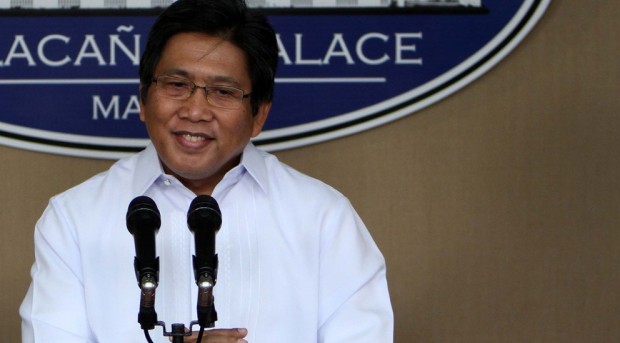Palace won’t stop PhilHealth, SSS hikes

Communications Secretary Herminio Coloma (in photo) defended the increase in Social Security System and Philippine Health Insurance Corp. premiums, saying the move should be understood in the context of the government’s “social protection” program. INQUIRER FILE PHOTO
Malacañang on Sunday rejected calls to stop the increase in Social Security System (SSS) and Philippine Health Insurance Corp. (PhilHealth) premiums, saying the move should be understood in the context of the government’s “social protection” program.
Communications Secretary Herminio Coloma defended both increases, saying the PhilHealth adjustment, in particular, would spare “sponsored members,” or the so-called poorest of the poor who receive aid from the government’s conditional cash transfer program.
“There’s no plan to stop [the increases],” he said in Filipino in his weekly media briefing aired over state-run Radyo ng Bayan.
Coloma said the adjustments were the “product of thorough study and consultation.”
The new rates were “evaluated and it was made sure that they would not be burdensome but instead could be shouldered by those concerned,” he said.
Article continues after this advertisementColoma said the increases would also “result in more meaningful benefits for members of the SSS and PhilHealth.”
Article continues after this advertisementEffective Jan. 1, the monthly PhilHealth premium of members with the lowest salaries was doubled to P200. The additional P100 contribution would be shouldered equally by the employee and the employer.
For SSS members, the monthly premium was increased by 0.6 percent. Coloma said the adjustment would cut the state pension fund’s P1.078-trillion unfunded liabilities by P166 billion.
Unfunded liabilities of a pension fund are obligations at a certain time in the future for which no funds have been set aside. In the case of the SSS, its existing fund would cover liabilities only until 2041, President Aquino said in July last year.
The President said an increase was needed to ensure the viability of the SSS fund, which he warned would be depleted 28 years from now if no adjustment was implemented.
He said the unfunded liabilities would grow by an average of eight percent yearly unless SSS revenues increased.
The President noted that since the 1980s, contributions had increased only twice but pension benefits had risen 21 times.
The 0.6-percent increase will be equally shared by members and their employers—0.3 percent is to be shouldered by SSS members and the other 0.3 percent by employers.
Before the increase, contributions were set at 10.4 percent to 11 percent of salaries of employees. Workers paid 30 percent of the contributions while employers carried the bigger share of 70 percent.
“We should understand the context of this social protection program, which includes the PhilHealth and SSS contributions,” Coloma said.
“Under the concept of social protection, the government provides aid to people who need it the most and it is assisted by those who have the capability to contribute, also for their own benefit, by pooling the resources,” he added.
Last year, SSS executives came under fire for gifting themselves with P1-million bonuses despite the looming increase in members’ monthly contributions.
PhilHealth officials and employees also got P1.5 billion in bonuses despite issues raised by the Commission on Audit over the allegedly slow processing of claims.
Coloma said the PhilHealth rate adjustment was “light” considering the benefits.
He cited the “intensified point-of-care enrollment for all Filipinos belonging to Class C-3 and Class B,” effective in all 85 public hospitals nationwide.
“If you look at the new schedule of premiums, it’s clear that the additional PhilHealth contribution being implemented is light,” he said.
RELATED STORIES:
Palace rejects calls to stop SSS, PhilHealth premium hike
Palace OKs hike in SSS member contributions